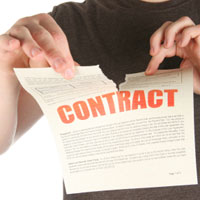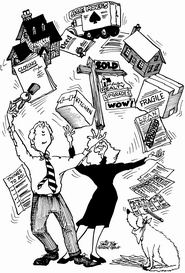Remedies available to buyer when the seller a materially breaches a purchase agreement contract include:
- Abandoning the transaction by entering into a mutual cancellation of the purchase agreement and escrow instructions
- Acquiring the property by pursuing specific performance of the purchase agreement
- Pursuing the recovery of money, whether or not the buyer still wishes to acquire the property
For example, when the seller resells the property to another buyer at a higher price after accepting an offer from the original buyer, the original buyer may pursue specific performance and demand the seller adhere to the purchase agreement.
However, if the original buyer decides not to pursue specific performance, the seller is liable to the original buyer for the difference in price. A buyer’s money claims include:
- General damages, money directly expended or the monetary value lost in the transaction
- Special damages, money collaterally lost due to the seller’s breach
- Prejudgment interest at the rate of 10% on all monies recovered.
A buyer is allowed to recover expenditures incurred prior to a seller’s breach to prepare a property so they can take possession, such as construction costs advanced by a buyer for upgrades and alterations. However, the purchase agreement by its provisions needs to reflect the intention of the buyer to incur these expenditures.
Conversely, a seller of real estate faced with a materially breaching buyer needs to promptly decide whether to:
- Enforce the purchase agreement;
- Re-market the property for sale; or
- Retain the property and postpone or entirely forego any resale effort.
A seller’s total recoverable losses when promptly re-marketing and reselling the property include:
- Carrying costs of mortgage interest payments, taxes, insurance, maintenance and utilities incurred by the seller and interest on the seller’s net equity between the date of the breach and the date escrow closed on the resale less the property’s rental value when the seller remains in possession; and
- Any reduction in the seller’s net proceeds on the resale below the net proceeds the seller was to receive from the breaching buyer’s transaction due to:
- The increased closing costs the seller additionally paid, such as the new buyer’s nonrecurring closing costs, financing fees on the resale and mortgage prepayment penalties; and
- Any decline in the property’s resale price.
When the seller takes the property off the market or is not diligent in their resale efforts, their recovery of money is limited to their out-of-pocket transactional expenses, property operating expenses incurred before the buyer’s breach, and any move out and move back relocation expenses to fulfill their performance under the purchase agreement.
When the seller remains in occupancy through the date of the breach, these costs are offset by the rental value of the property.




